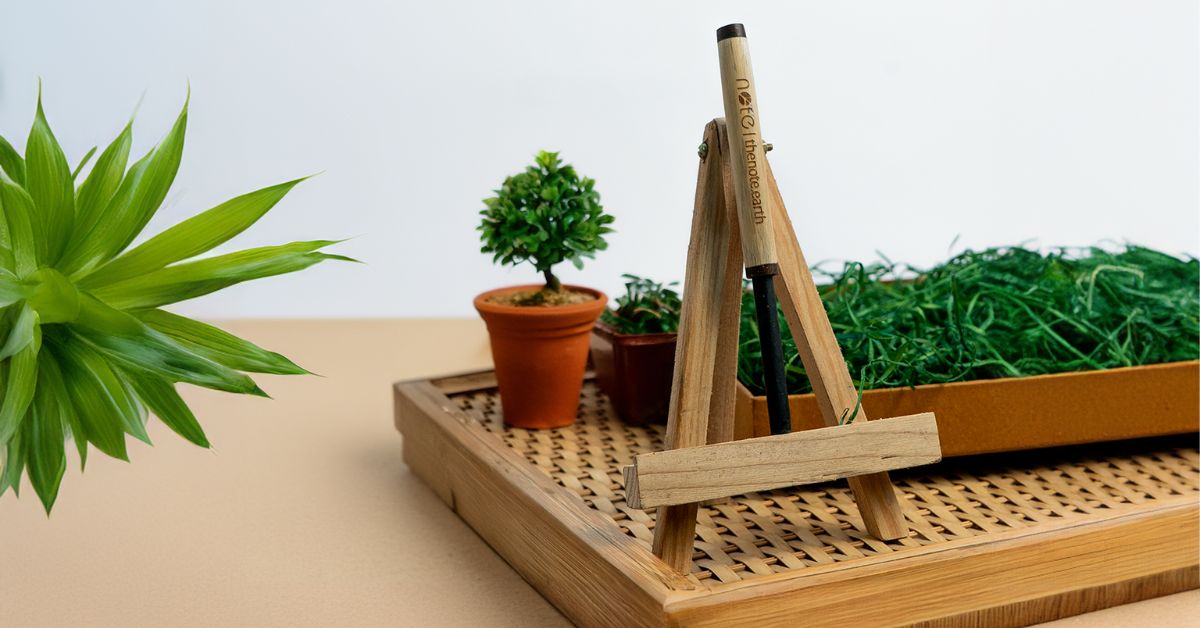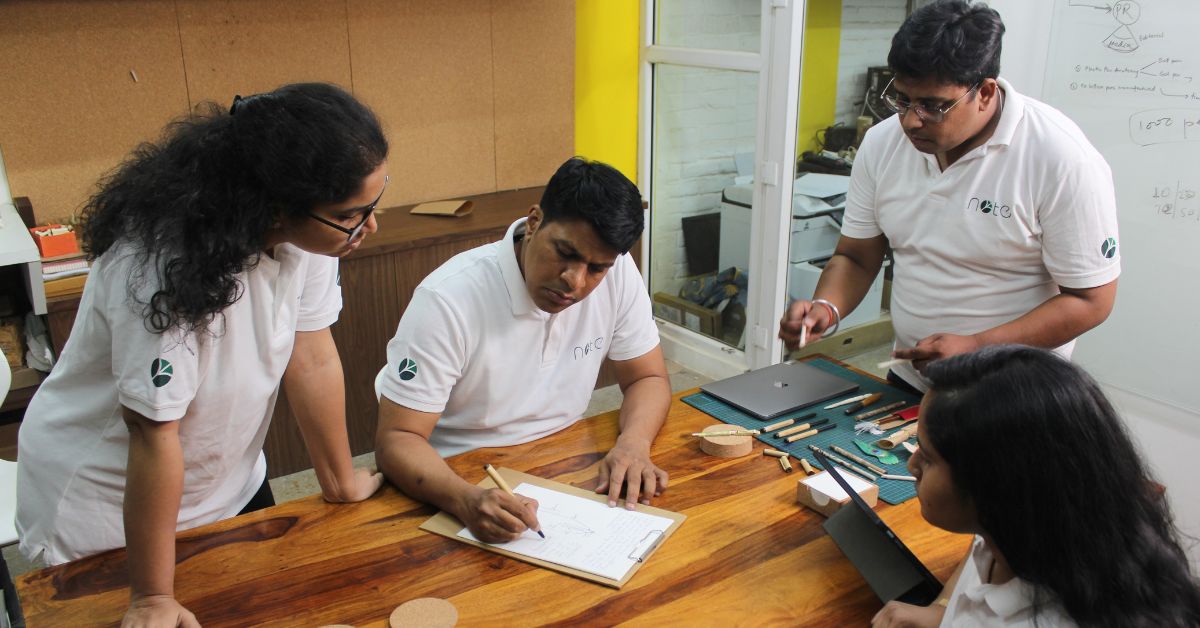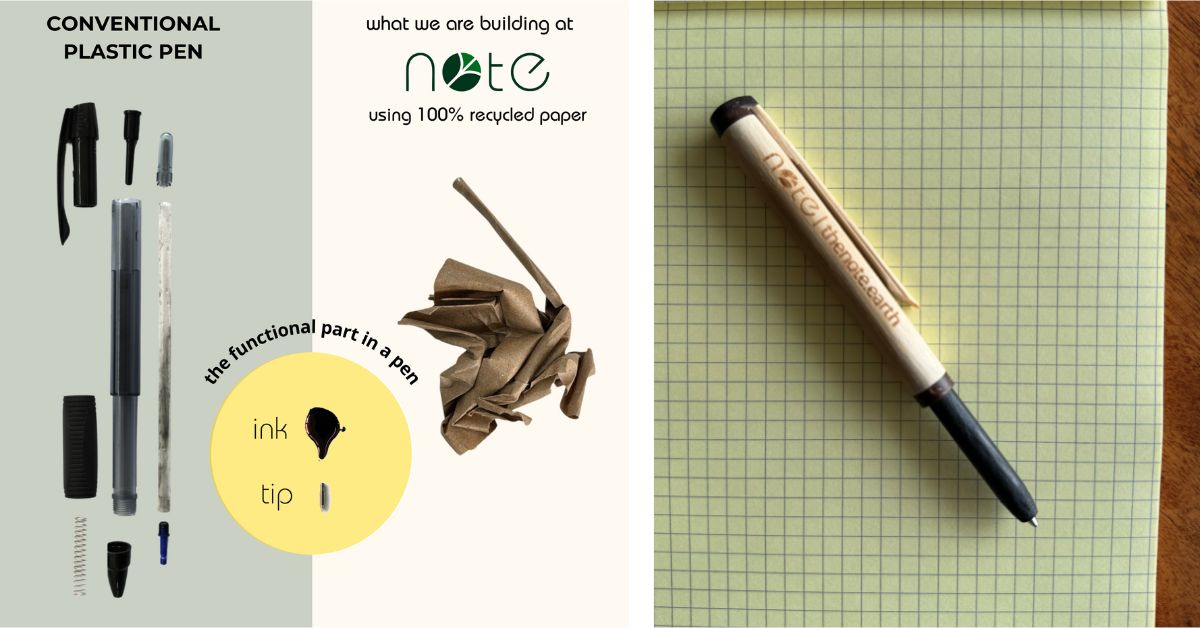The concept of living sustainably is a popular topic of discussion in the country. Many people are consciously seeking sustainable alternatives, recognising the impact our actions have on the environment. This movement has inspired Indian innovators to develop solutions we didn’t know existed. From toothbrushes and crockery to speakers and headphones, we now have products that eliminate the use of plastic.
“It is small steps on the part of the consumer that matters a lot. I believe that if we give them the alternative, they will choose it,” says Saurabh H Mehta, the founder of NOTE — a sustainable product company.
In a conversation with The Better India, Saurabh reveals his recently patented product — a biodegradable pen. Claiming to be one of the first producers of a pen with zero percent plastic, the innovator takes us through his journey.
‘I was mocked for my idea’
Hailing from Delhi, Saurabh initially worked in the energy sector. “I worked in rural areas where there was no electricity supply, trying to connect them. Slowly, I realised that the problem was being solved and I needed to shift to something else,” he says.
Realising that he wanted to be closer to his family, switching to try his family business seemed like a reasonable option. “My older brother has his own business and my father was on the verge of slowing shutting down the business. I decided to try my hand at it,” he says.
The family business was making ballpoint pens, he informs. When he joined the business, he felt the urgent need for innovation in the industry. “I realised how 95 percent of a pen is plastic with no use other than holding the ink. In a world where everyday people are trying to be more eco-friendly, I realised that my heart would never allow me to do this,” he says.
Saurabh decided to take a sustainable approach to making pens. “I thought how hard could it be, right? I already have an existing structure to work with,” he shares.

“The industry was already shifting towards a use-and-throw disposable model by design and virtue. The entire industry embraced this disposable mindset. When I joined in 2016, it took me just a few months, or at most a year, to realise that this wasn’t something I could devote the next 10 or 20 years to. Given my commitment to environmental sustainability, I felt there was something seriously wrong with this approach,” he notes.
Recalling the time when he presented the idea to his family, he says, “Initially, there was a lot of scepticism. I was mocked for even thinking it was possible, but as I progressed with my research, my father came around. I decided to separate myself from the family business and start NOTE, which stands for No Offence To Earth, in 2018,” he says.
Made with bamboo, coconut shell and zero plastic
“While plastic straws, bags, and bottles are widely discussed, items like pens are rarely mentioned. However, the plastic waste from pens is substantial, comparable to 50 percent of the plastic straw problem. The lack of discussion around this issue was striking,” shares Saurabh.
He adds, “I realised there were no real alternatives to plastic pens. Some efforts reduced the plastic content by 50, 70, or even 88 percent, but plastic was still present. Tests showed that even pens with paper bodies and plastic cores acted like laminated paper cups, preventing full biodegradability.”
Saurabh shares why it is important to make sustainable stationery. “The problem we faced was that 95 percent of a pen is composed of non-biodegradable materials, primarily plastic and metal mixtures. These plastics are often different types, such as PVC, and polycarbonate, each with different properties. The damage caused by these materials is significant because the components can’t be easily disassembled and recycled separately,” he informs.
“There is no economic value in recycling them, making it practically impossible to recycle these pens. Consequently, they won’t biodegrade for the next 300 years or more. This amplifies the problem: with an annual production volume of 50 billion pens, all of this plastic waste cannot be recycled and won’t biodegrade,” he reiterates.

Unlike plastic bottles, pen plastics are problematic. While PET bottle recycling rates are not perfect, they exist and are improving. In contrast, there is currently no effective recycling solution for pen plastics.
“This is why we invested significant time and effort into finding alternatives. We experimented with various materials and methods to replace plastic. Our solution involves using recycled paper and vegetable oil. The vegetable oil acts as a barrier between the ink and the paper, providing the necessary functionality without relying on plastic, shares Saurabh.
The body of the pen is made of bamboo and the cap is made of coconut shell — this simple yet effective approach has allowed him to create pens that are both sustainable and functional.
Saurabh experimented from 2018 to 2020 before finally narrowing down to one design. “We tried various methods to reduce and eliminate plastic in pens. We conducted numerous trials, each requiring extensive testing for shelf life, which must be 18 months. Each test took around six months to yield results,” he says.
“Finally, in January this year, we achieved a breakthrough. Our current method allows us to produce pens with an 18-month shelf life without plastic. This marks a significant milestone in our journey toward sustainable stationery,” he shares.
Currently, the pens are available for bulk purchase by businesses. So far, he has sold 20,000 pens and hopes to increase this number in the future.
Aditya Pratap Singh, who is a sports professional and a team member of Youth For Climate India, used the biodegradable pen. “Being an environment advocate, climate change and plastic pollution deeply concern me. I have a bag full of refills of pens that I used. While the problem seems small, I was looking for an alternative. When I found out about Saurabh’s innovation, I was intrigued and bought two pens from him,” he says.

“I just opened one of them to see if there was really zero use of plastic. It was true, he used materials like bamboo and coconut shells but no plastic. The pen, to be precise, feels exactly like any other pen. You won’t even feel a difference,” he adds.
Saurabh informs that the price of the pen currently starts from Rs 30 and goes up to Rs 300. “However, I am currently working on making it available at competitive prices as plastic-based pens to make it available to the masses,” he remarks.
“I believe that if there is an alternative available for people to use, they will opt for it. While a pen might sound like a small thing, if you look at the bigger picture, even small efforts matter,” he adds.
(Edited by Pranita Bhat; All Images Credit: Saurabh)
No comments:
Post a Comment